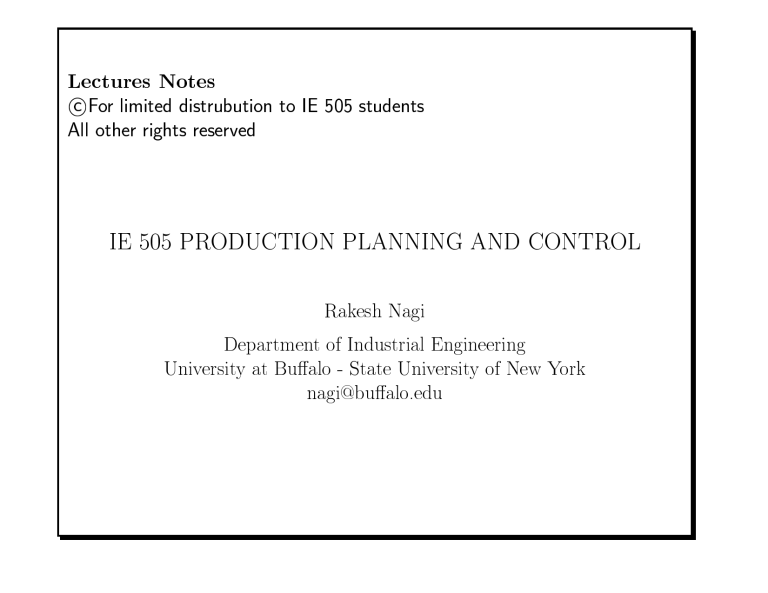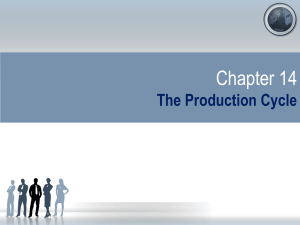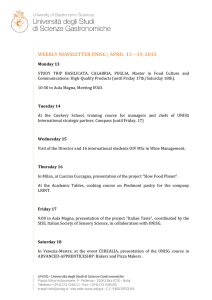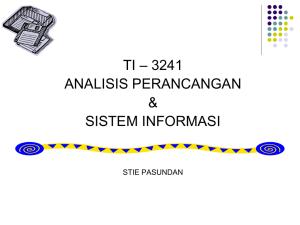
Lectures Notes
c For limited distrubution to IE 505 students
All other rights reserved
IE 505 PRODUCTION PLANNING AND CONTROL
Rakesh Nagi
Department of Industrial Engineering
University at Bu alo - State University of New York
nagi@bu alo.edu
IE 505 PRODUCTION PLANNING AND CONTROL
Course Outline
Introduction
Overview of Production and Operations Strategy
Forecasting
Aggregate Planning
Inventory Control (Known and Uncertain Demand)
Supply Chain Management
Materials Requirements Planning, Just-In-Time
Operations Scheduling
Project Scheduling
Recent Advances
c Rakesh Nagi
University at Bu alo - IE
1
PRODUCTION AND OPERATIONS STRATEGY
1. INTRODUCTION
IE 505 PRODUCTION PLANNING AND CONTROL
1. Introduction
1. Introduction
1. Manufacturing/Production Function
=)
Raw materials
Resources
Workers Machines =)
Factory
Finished Goods
2. Functional areas of a rm
2.1. Marketing
2.2. Finance
2.3. Production
3. Di erence between manufacturing and production?
c Rakesh Nagi
University at Bu alo - IE
4
IE 505 PRODUCTION PLANNING AND CONTROL
1. Introduction
1.A Problems in Production Management
Inventory
Production Scheduling and Control
Equipment Selection and Replacement
Maintenance
Size and Location of Plants
Plant Layout and Structure
Quality Control and Inspection
TraÆc and Material Handling
Methods
c Rakesh Nagi
University at Bu alo - IE
5
IE 505 PRODUCTION PLANNING AND CONTROL
1. Introduction
NEED: US competitiveness; declining exports
What has happened?
Failure to recognize the size of competitive challenge
Failure to appreciate the impact of increasing manufacturing capacity
in 60's capacity demand; now capacity > demand
Failure to invest in R&D
Top management's lack of manufacturing experience
Production manager's obsession with short term performance measures
P rofits
ROI
Investments
=
c Rakesh Nagi
University at Bu alo - IE
6
IE 505 PRODUCTION PLANNING AND CONTROL
1. Introduction
1.B Elements of Production and Operations Strategy
1. Time horizon:
Short
Medium
Long
2. Focus
Process Technologies
Market Demands (Price, LT, reliability)
Production Volume
Quality Level
c Rakesh Nagi
University at Bu alo - IE
7
IE 505 PRODUCTION PLANNING AND CONTROL
1. Introduction
Manufacturing tasks
3. Evaluation
Cost
Quality
Pro tability
Customer Satisfaction
4. Consistency
Professionalism
Product proliferation
Manufacturing tasks should be made explicit
c Rakesh Nagi
University at Bu alo - IE
8
2. CAPACITY GROWTH PLANNING: LONG-TERM
STRATEGIC PLANNING
IE 505 PRODUCTION PLANNING AND CONTROL
2. Capacity Growth Planning: long-term strategic planning
Capacity strategy depends on
1.
2.
3.
4.
Demand Pattern
Cost for new facility
New process technology
Competitor's strategy
When, Where and How much
c Rakesh Nagi
University at Bu alo - IE
10
IE 505 PRODUCTION PLANNING AND CONTROL
2. Capacity Growth Planning: long-term strategic planning
2.A Example Problem: Make or Buy decision
Buy from some outside source: c1=unit
Internal production:
c2=unit
c2 < c1; Set-up or Investment cost $K to expand
Cost for c1=unit products BUY c1x
MAKE K + c2x
x = K=(c1 c2)
c Rakesh Nagi
University at Bu alo - IE
11
c Rakesh Nagi
Make
k + c2x
x
Break Even Point
Buy
c1x
12
2. Capacity Growth Planning: long-term strategic planning
University at Bu alo - IE
IE 505 PRODUCTION PLANNING AND CONTROL
Cost
IE 505 PRODUCTION PLANNING AND CONTROL
2. Capacity Growth Planning: long-term strategic planning
2.B. Dynamic Capacity Expansion Policy
Maximize:
Market share
Utilization
Assume: Demand is increasing linearly (deterministic)
c Rakesh Nagi
University at Bu alo - IE
13
IE 505 PRODUCTION PLANNING AND CONTROL
D
x
r
f (y )
C (x)
=
=
=
=
=
e rx =
C (x) =
=
=
c Rakesh Nagi
2. Capacity Growth Planning: long-term strategic planning
Annual increase in demand
Time interval between addition of successive plants
Annual discount rate(compounded continuosly)
Cost of opening a plant of capacity y
Total discounted costs over an 1 horizon;
given that a plant opens at time 0
NPV of $1 incurred x years in future
f (xD) + f (xD)e rx + f (xD)e 2rx + f (xD)[1 + e rx + e 2rx + ]
f (xD)
1 e rx
University at Bu alo - IE
14
Demand / Capacity
IE 505 PRODUCTION PLANNING AND CONTROL
xD
Ct
x
t
c Rakesh Nagi
2. Capacity Growth Planning: long-term strategic planning
t+x
University at Bu alo - IE
Time
15
IE 505 PRODUCTION PLANNING AND CONTROL
c Rakesh Nagi
2. Capacity Growth Planning: long-term strategic planning
University at Bu alo - IE
16
IE 505 PRODUCTION PLANNING AND CONTROL
2. Capacity Growth Planning: long-term strategic planning
Empirical evidence from industry
f (y) = kya
a : Indicator of Ratio of incremental to average cost of unit plant capacity
a < 1; a = 0:6 in general
k(xD)a
C (x) =
1 e rx
To nd x that minimizes C (x) set
c Rakesh Nagi
dC (x)
dx
= 0
University at Bu alo - IE
17
IE 505 PRODUCTION PLANNING AND CONTROL
2. Capacity Growth Planning: long-term strategic planning
dC (x)
e rx)axa 1 xa(re
a (1
= kD
dx
(1 e rx)2
a(1 e rx)
x=
re rx
rx)
=0
a = erxrx 1
Read:
1. Features one needs to consider in capacity planning
2. Issues in plant location
c Rakesh Nagi
University at Bu alo - IE
18
3. LEARNING AND EXPERIENCE CURVES
IE 505 PRODUCTION PLANNING AND CONTROL
3. Learning and Experience Curves
3. Learning and Experience Curves
Respectively,
Labor hrs/unit
vs # units
Marginal production cost vs # units
Y (u)
Y (u)
a
b
:
=
:
:
# of labor hours for u
au
b
# hours for the rst unit
factor for measuring decline in marginal prod. hrs
80% learning curve =) time for 2u
c Rakesh Nagi
thunit
th unit is 80% of the u th unit
University at Bu alo - IE
20
IE 505 PRODUCTION PLANNING AND CONTROL
Y (2u)
Y (u)
a(2u)
au
3. Learning and Experience Curves
= 2 b = 0:80
b ln 2 = ln(0:8)
:8)
b = ln(0
ln(2) = 0:3219
=
b
b
Usually plot ln Y versus ln(cumulative # units)
c Rakesh Nagi
University at Bu alo - IE
21
4. PRODUCT AND PROCESS LIFE CYCLES
IE 505 PRODUCTION PLANNING AND CONTROL
4. Product and Process Life Cycles
Product Life Cycle
1. Start-up
2. Rapid growth
3. Maturation
4. Stabilization/Decline
c Rakesh Nagi
University at Bu alo - IE
23
IE 505 PRODUCTION PLANNING AND CONTROL
4. Product and Process Life Cycles
Process Life Cycle
1. Early - job-shop
2. Middle - automation
3. Mature - standardization
Product-Process Matrix
job-shop
ow/batch
assembly
continuous ow
c Rakesh Nagi
low med
printers
autos
! Volume
large
chemicals
" complexity
University at Bu alo - IE
of process
24



